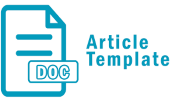Exploring Female Teachers’ Intrinsic and Extrinsic Motivation to Keep Teaching the Girls in Afghanistan After the Taliban’s Ban on Girls Education
Abstract
Keywords
Full Text:
PDFReferences
Baiza, Y. (2013). Education in Afghanistan: Developments, influences and legacies since 1901. Routledge.
Bamik, H. (2018). Afghanistan’s cultural norms and girls’ education: Access and challenges. International Journal for Innovative Research in Multidisciplinary Field, 4(11), 83-93.
Broussard, S. C., and Garrison, M. E. B. (2004). The relationship between classroom motivation and academic achievement in elementary school-aged children. Family and Consumer Sciences Research Journal, 33(2), 106–120.
Clarke, V., and Braun, V. (2017). Thematic analysis. The journal of positive psychology, 12(3), 297-298.
Coladarci, T. (1992). Teachers' sense of efficacy and commitment to teaching. The Journal of experimental education, 60(4), 323-337.
Deci, E. L., and Ryan, R. M. (1985). The general causality orientations scale: Self-determination in personality. Journal of research in personality, 19(2), 109-134.
Deci, E. L., Koestner, R., and Ryan, R. M. (1999). A meta-analytic review of experiments examining the effects of extrinsic rewards on intrinsic motivation. Psychological Bulletin, 125(6), 627–668.
Dörnyei, Z., and Ushioda, E. (2001). Teaching and researching motivation. New York, NY: Longman.
Dupree, L. (1979). Afghanistan under the Khalq. Probs. Communism, 28, 34.
Faghfoory, M. H. (1993). The impact of modernization on the Ulama in Iran, 1925–1941. Iranian Studies, 26(3-4), 277-312.
Flick, U., Von Kardorff, E., and Steinke, I. (2004). What is qualitative research? An introduction to the field. A companion to qualitative research, 1, 3-11.
Ghashghai, E., & Lewis, R. (2002). Issues affecting internet use in Afghanistan and developing countries in the Middle East. Rand.
Guay, F., Chanal, J., Ratelle, C. F., Marsh, H. W., Larose, S., and Boivin, M. (2010). Intrinsic, identified, and controlled types of motivation for school subjects in young elementary school children.
British Journal of Educational Psychology, 80(4), 711–735.
Kavazanjian, L. (2010). Addressing Gender Disparities: An Investigation of Nonformal Education in Afghanistan. Women's Policy Journal of Harvard, 7.
Kayen, H. S. (2022). Improvements and Setbacks in Women’s Access to Education: A Case Study of Afghanistan. Muslim Education Review, 1(1), 19-36.
Khwajamir, M. (2016). History and problems of education in Afghanistan. In SHS Web of Conferences (26), 1124. EDP Sciences.
Ko, S., and Rossen, S. (2017). Teaching online: A practical guide. Taylor & Francis.
Moghadam, V. M. (1992). Patriarchy and the politics of gender in modernising societies: Iran, Pakistan and Afghanistan. International Sociology, 7(1), 35-53
Moses, I., Admiraal, W. F., and Berry, A. K. (2016). Gender and gender role differences in student–teachers’ commitment to teaching. Social psychology of education, 19, 475-492.
Rostami Povey, E. (2003). Women in Afghanistan: Passive victims of the borga or active social participants?. Development in Practice, 13(2-3), 266-277.
Samady, S. R. (2001). Education and Afghan society in the twentieth century. Paris: UNESCO Publication.
Shayan, Z. (2015). Gender inequality in education in Afghanistan: Access and barriers. Open Journal of Philosophy, 5(05), 277-284.
Sinclair, C. (2008). Initial and changing student teacher motivation and commitment to teaching. Asia-Pacific Journal of Teacher Education, 36, 79–104.
Tohidi, H., and Jabbari, M. M. (2012). The effects of motivation in education. Procedia-social and behavioral Sciences, 31, 820-824.
UNESCO. (2023). Let Girls and Women in Afghanistan Learn!. UNESCO publication
UNWOMEN. (2021). Women’s rights in Afghanistan: Where are we now. Gender Alert No.1
Williams, M., and Burden, R. L. (1997). Psychology for Language Teachers: A social constructivist approach. Cambridge: Cambrige Univesity Press.
Winthrop, R., and Kirk, J. (2008). Learning for a bright future: Schooling, armed conflict, and children’s well-being. Comparative Education Review, 52(4), 639-661.
Zucchino, D., and Blue, V. (2021). A Harsh New Reality for Afghan Women and Girls in Taliban-Run Schools. In The New York Times.
DOI: https://doi.org/10.17509/civicus.v23i2.64693
Refbacks
- There are currently no refbacks.
Copyright (c) 2023 JURNAL CIVICUS

This work is licensed under a Creative Commons Attribution-NonCommercial-ShareAlike 4.0 International License.
Our journal indexed by :
Jurnal Civicus is published Univesitas Pendidikan Indonesia in collaboration with Indonesia Association Profession of Pancasila and Civic Education/Asosiasi Profesi Pendidikan Pancasila dan Kewarganegaraan (AP3KnI).

Jurnal Civicus is licensed under a Creative Commons Attribution-NonCommercial-ShareAlike 4.0 International License.

.png)




__.png)










